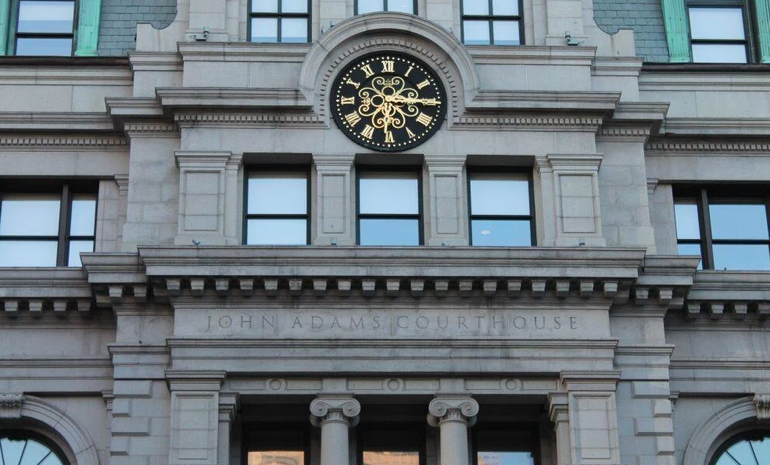Voters are on track to get the final say over whether Massachusetts businesses should pay a higher minimum wage to tipped employees after the state’s highest court on Thursday concluded that a proposed ballot question is properly drafted.
The Supreme Judicial Court ruled that Attorney General Andrea Campbell’s office was correct to certify a measure that would phase out the separate minimum wage for workers who earn gratuities, turning aside a challenge brought by the head of the Massachusetts Restaurant Association and others.
Plaintiffs in the case contended that increasing what employers owe to tipped workers and also allowing businesses to divide those tips between tipped and non-tipped employees were too unrelated to be considered with a single yes or no vote.
The challenge asserted that the proposal ran afoul of a constitutional requirement that initiative petitions present only related topics, but judges ruled the measure presents a “unified statement of public policy” that voters are capable of deciding with a single bubble on the ballot.
Justice Scott Kafker wrote in the ruling that the court had “no difficulty concluding that the initiative here satisfies the relatedness requirement.”
“The provisions are closely related and share a well-defined common purpose related to ending the existing compensation system common to tipped industries,” Kafker wrote.
Steve Clark, the president of the Massachusetts Restaurant Association, said his group will continue to campaign in opposition to the question. He doubled down on criticism of the proposal in reaction to Thursday’s ruling and claimed many tipped employees oppose the idea “brought from activists in California.”
“Servers and bartenders from across Massachusetts have been reaching out to express fear that this question will take money out of their pockets. This decision simply increases that concern,” Clark said in a statement. “Servers and bartenders have always had the exclusive right to their earned tips and previous SJC rulings have affirmed as much. Today’s decision allows an out-of-state group with ‘anonymous’ money, the opportunity to try to negatively impact servers, owners and customers across the restaurant industry.”
The national One Fair Wage group, which is leading the ballot question campaign here and similar efforts in Michigan, Ohio and Arizona, celebrated the ruling as “a significant victory for Massachusetts workers and voters.”
“The court has rightly sided with the people, recognizing that workers have the right to decide this issue at the ballot,” said Saru Jayaraman, the group’s president and director of the University of California-Berkeley Food Labor Research Center. “We are excited to finish the final stages of signature gathering and certification and launch our statewide campaign to win a full minimum wage with tips on top for hundreds of thousands of Massachusetts service workers!”
Campaigns need to collect at least 12,429 more signatures from registered voters as the final hurdle. They must submit those signatures to local elections officials for certification by the close of business on June 18, then with Secretary of State William Galvin’s office by the close of business on July 3 to secure a spot on the ballot.
State law sets the minimum wage at $15 per hour, but businesses can pay tipped employees as little as $6.75 per hour as long as the combination of wages and gratuities totals at least $15 per hour. If a tipped worker does not earn enough from customers to reach that threshold, their employer must make up the difference.
Reform supporters say forcing workers to rely on tips for a major portion of their wages puts women and people of color in particular at an economic disadvantage.
The ballot question would gradually increase the rate employers must pay tipped workers over a five-year period until it matches the statewide minimum wage. Employees could still earn gratuities during and after that span, at which point all tips would supplement — rather than contribute to — their wages.
The statewide minimum wage has not been raised since Jan. 1, 2023 and no increases are scheduled.
The question would also allow but not require employers to create tip pools, which would gather and redistribute gratuities among all workers, including those at the back of the house like dishwashers and cooks who traditionally do not earn tips.
Plaintiffs argued that sharing gratuities between all workers might undermine the pay boost tipped workers could expect to receive from the wage changes. Judges who reviewed the question said they found “a number of problems” with that logic.
“The purpose of the law as derived from its provisions is not necessarily to increase compensation of tipped employees but to ensure that all employees in tipped industries are paid a minimum wage by their employers without such wages being subsidized by customer tips,” Kafker wrote. “The customer tips will then be available to supplement wages for all employees.”
The court also shot down the idea that the question’s backers “logrolled,” or quietly slid an unpopular, contentious idea into the initiative petition that would be overlooked by voters and commenters.
Kafker pointed out that the petition totals four pages and “uses a relatively simple structure of gradually raising the minimum wage for a period of five years.” He contrasted it from the 2022 El Koussa case, in which the court spiked an industry-backed ballot question overhauling status and benefits for app-based drivers.
“Unlike the petition in El Koussa, the language of both [tipped wage] provisions is clear and their intended effect can be easily understood without needing to carefully parse statutory language,” Kafker wrote.
With more decisions expected soon on certification challenges, the court is still reviewing five drafts of a successor version of that driver question, which opponents once again challenged as ineligible to go before voters for combining too many topics, as well as another measure that would allow Uber and Lyft drivers to unionize.

